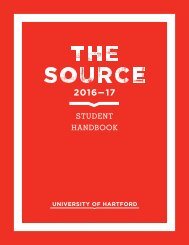advising
Create successful ePaper yourself
Turn your PDF publications into a flip-book with our unique Google optimized e-Paper software.
COLLEGE OF EDUCATION, NURSING AND HEALTH PROFESSIONS<br />
Advising Information: 860.768.4692<br />
presented through small-group, intensive laboratory units employing<br />
modern research techniques. Formal lectures unify laboratory<br />
experiences. Prerequisite: Minimum of one year of high school<br />
chemistry. Corequisite: Either CH 110 or 111, or CH 114 or 136.<br />
Laboratory fee.<br />
BIO 212, 213 Human Anatomy and Physiology [4, 4]<br />
A study of human tissues and organ systems. BIO 112: muscular,<br />
skeletal, nervous, and endocrine systems; skin and special<br />
senses. BIO 113: circulatory, respiratory, digestive, excretory, and<br />
reproductive systems; blood and metabolism. Laboratory dissection<br />
and physiology experimentation are coordinated with the lecture<br />
material. This course is for health science students. Prerequisite or<br />
corequisite: CH 114 and CH 136, or CH 110-111. Laboratory fee.<br />
Chemistry<br />
CH 110-111 College Chemistry [4-4]<br />
Basic principles of chemistry, including atomic and molecular<br />
theory and structure; the chemical and physical behavior of gases,<br />
solids, liquids, and solutions; chemical equations; thermochemistry;<br />
chemical equilibrium; acid-base theory; electrochemistry; kinetics;<br />
nuclear chemistry; metal complexes; and an introduction to<br />
inorganic and organic chemical reactions. Laboratory experiments<br />
designed to acquaint students with quantitative measurements<br />
as applied to chemical behavior. For science, engineering, and<br />
mathematics majors. One three-hour laboratory in addition to<br />
lecture. Prerequisites: Working knowledge of algebra and logarithms.<br />
CH 110 for CH 111. Laboratory fee.<br />
CH 114 Principles of Chemistry I [4]<br />
Chemistry of solids, liquids, gases, and solutions; colligative<br />
properties, bonding theory, acids and bases, and chemical equilibria.<br />
Designed for students, such as nursing, health science, humanities,<br />
and social science majors, who desire or require a one-semester<br />
introduction to the principles of inorganic and physical chemistry.<br />
May be used to fulfill part of the general education distribution<br />
requirements in the natural sciences. The combination of CH 114<br />
and CH 236 constitutes a one-year general survey of the major<br />
areas of chemistry. (Not intended for majors in natural science,<br />
engineering, or pre–health professions programs.) No credit given<br />
to students who have received credit for CH 110 and/or CH 111,<br />
or equivalent. One three-hour laboratory in addition to the lecture.<br />
Prerequisite: Working knowledge of algebra and logarithms.<br />
Laboratory fee.<br />
CH 136 Principles of Chemistry II [4]<br />
The chemistry of carbon compounds, including functional group<br />
chemistry, natural products, stereochemistry, and compounds and<br />
processes of biochemical importance. Designed for students who<br />
desire or require a one-semester introduction to organic chemistry<br />
and biochemistry. The combination of CH 114 and CH 136<br />
constitutes a one-year general survey of the major areas of chemistry.<br />
(Not intended for majors in biology [B.S.], chemistry, engineering,<br />
or physics, or for students planning to apply to a professional school<br />
in the medical sciences [premedical, predental, etc.]) No credit given<br />
to students who have received credit for CH 230 and/or CH 231,<br />
or equivalent. One three-hour laboratory in addition to lecture.<br />
Prerequisite: CH 114 or equivalent. Laboratory fee.<br />
Communication<br />
CMM 115 Improving Communication Skills [3]<br />
Designed to help students develop skill and confidence in two<br />
speaking contexts: didactic and public speaking. Course emphasizes<br />
self-assessment, adaptation to listeners and situations, organization<br />
and support ideas, and effective delivery. (Does not fulfill<br />
requirements for the communication major.)<br />
Computer Science<br />
CS 110 Introduction to Computers [3]<br />
Designed for non-science majors, the course emphasizes the<br />
computer’s capabilities, its limits, and its impact on society. Personalcomputer<br />
productivity software is used to demonstrate the influence<br />
of computers on society. Students are also provided an introduction<br />
to the Internet through the use of a web browser and an email<br />
facility. Not open to students who have completed a higher-level<br />
CS course. Laboratory fee.<br />
Education<br />
EDF 120 Introduction to Education:<br />
Schooling and Human Services [3]<br />
This course introduces students to the process of education and<br />
development as it occurs in schools and social service agencies. It<br />
offers a foundation in reflective practice and in the knowledge, skills,<br />
and dispositions that are central to these professions. It also focuses<br />
on how schools and human service agencies can work together to<br />
address issues of concern in the community. The course includes a<br />
community-service learning component of two hours weekly.<br />
Laboratory fee.<br />
EDH 220 Psychology of Exceptionalities [3]<br />
An introductory undergraduate course for the prospective majors<br />
and non-majors in special education that surveys the various<br />
exceptionalities in the population with attention to their etiology,<br />
characteristics, contemporary educational practices, and treatment<br />
procedures. A fieldwork component is required. Prerequisite(s):<br />
Sophomore status or permission of instructor. Laboratory fee.<br />
EDP 132/PSY 132 Human Development [3]<br />
Theories and research in human development from infancy through<br />
adulthood. Students carry out structured observations and integrate<br />
these observations with various theoretical issues. Prerequisite:<br />
EDF 120 or permission of department. (Fa/Sp)<br />
EDP 220 Learning and Development: Understanding<br />
Yourself and Others [4]<br />
This course examines major milestones in cognitive and social<br />
development from infancy through adolescence, as well as the<br />
diversity of learning needs and styles. Preservice teachers also develop<br />
a better understanding of their current position and style as learners<br />
and of the developmental processes that brought them this far. The<br />
preservice teachers will be able to demonstrate understanding of<br />
basic concepts and the ability to apply them. Prerequisite: PSY 101,<br />
102, or 105.<br />
29



